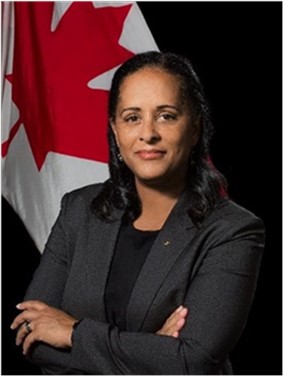
by Dave Tulloch
In 1952, the Canadian Government passed “a new Immigration Act (that) maintained Canada’s (historic) discriminatory policies against non-European and non-American immigrants.” However, in 1962, ten years later, “the federal government ended racial discrimination as a feature of the immigration system.” Up until this point, the “White Canada” policy laid down in the Immigration Act of 1910 remained in effect. In 2020 Caroline Xavier, a Black woman, whose parents immigrated from Haiti to study in Canada, was appointed Associate Deputy Minister (ADM) of Immigration, Refugees and Citizenship Canada. In effect, Caroline took charge of the same department that was responsible for barring people of her race from entering Canada less than sixty years earlier.
It was this change in Canada’s immigration policy that allowed her parents to leave their native Haiti and enter Canada as students in the pursuit of post-secondary education in Montréal. Caroline was born in Montréal. Her parents instilled in her the value of education. She finished her primary education and did most of her secondary education in Haiti but completed her final year in New York. Caroline subsequently graduated from the University of Ottawa with and Bachelor of Administration (Conc. Marketing and Informatics), and later earned an Executive Master’s degree in Electronic Commerce from Dalhousie.
Caroline explains Canada’s transformation post the 1962 immigration act. “Canada is (now) increasingly diverse. People come to our country from a wide range of places and with a variety of backgrounds, experiences, and knowledge—wider and richer than ever before. That’s great to see and something we need to continue. Yet diversity is just half the equation. We also must be a more inclusive country. A truly equitable Canada is a place in which our businesses, organizations, and public institutions have an array of faces, and the people behind them are in positions at every level and play fundamental roles in decisions and actions. A more inclusive public service is imperative. A public service that reflects the people it serves makes more informed policies, does a better job of delivering services, and, because it’s smart and efficient, earns and keeps the trust of Canadians. Diversity and inclusion make for good business, period. Any workplace that’s diverse and inclusive is likely to be successful and resilient. A more inclusive public service is also personal. I’m the child of Haitian immigrants and the first Black person—male or female—to reach the deputy minister rank in the federal public service. I started as a student in an HR role over 30 years ago and just recently assumed the duties of Deputy Minister at the Communications Security Establishment (CSE). It’s an achievement I’m extremely proud of. “
Prior to this appointment, Caroline held several very high-profile positions within the Federal Government, including executive positions with CSE, Industry Canada, and the Canada Revenue Agency, and roles as Vice-President and Associate Vice-President of the Operations Branch at the Canada Border Services Agency (CBSA). Caroline indicated that she was pleased with her career progression at that time and completely satisfied with her role as a VP with CBSA. In fact, she was not looking for further career progress after that position. “I thought that I would retire after this job.” But in 2017, she became Assistant Secretary to the Cabinet, Security, and Intelligence at the Privy Council and, in 2020, was named Associate Deputy Minister of Immigration, Refugees, and Citizenship Canada.
Just two years after being named ADM for Immigration and associated services, Caroline was appointed to the Deputy Minister role as Chief of the Communications Security Establishment (CSE), reporting to the Honourable Anita Anand PC MP, Minister of National Defence. This is one of the most sensitive roles in the Federal government. Caroline is “the head of the federal agency responsible for protecting Canada’s government and critical infrastructure from cyber threats.” Her responsibilities include cyber security and information assurance, foreign intelligence, defensive and active cyber operations, and technical and operational assistance. She enthusiastically credits her highly qualified and competent staff with the department’s ability to ward off the constant barrage of external threats to Canada’s security.
Caroline approached her career by; exposing herself to all facets of the departments where she worked, accepting lateral positions, building networks of knowledgeable and influential people, building on her successes, and learning from her mistakes, while maintaining the core attitude that overall “failure is not an option.”
